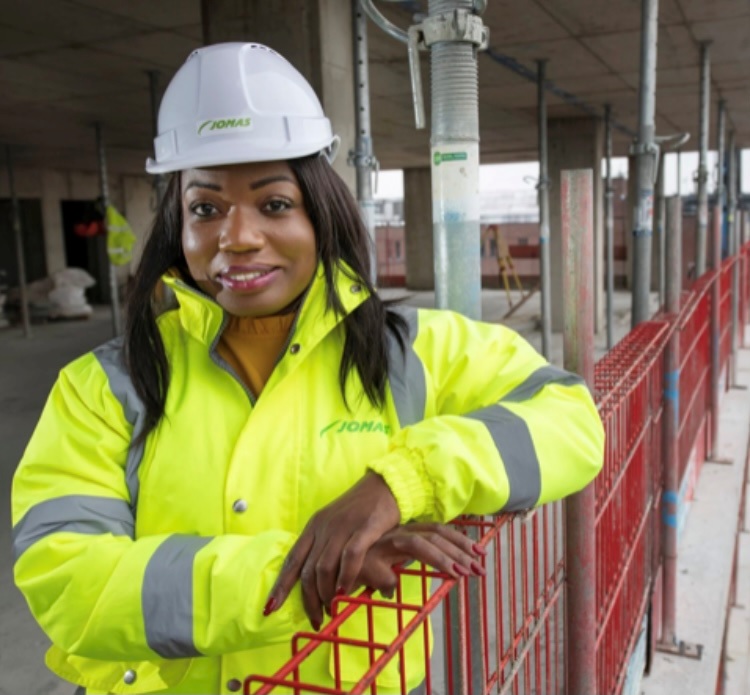Roni Savage is surrounded by men. “I have four older brothers, three sons and work in a male-dominated industry,” said the chartered engineer, who founded Uxbridge-based Jomas Associates, a construction services, engineering and environmental firm, in 2009.
If that wasn’t enough of a challenge, she is also a British-born black entrepreneur of Nigerian descent. In the early years of building her multimillion-turnover firm she did not include photos of herself on her website or social media.
Speaking to Times Enterprise Network before Black Business Week in October, she described the barriers she faced, the importance of education and mentors in her life, and why she feels so passionately that more young people from disadvantaged backgrounds should have the opportunity to succeed.
“It takes a lot of resilience,” said Savage, 41, of being one of only a tiny minority of black entrepreneurs in the UK. “There are a number of strands to the barriers. A key one is that there is no one around you who looks like you. It’s a significant barrier that many people don’t realise. You walk into the room and you stand out immediately and people make comments. They can be positive and negative and it takes having a thick skin to either offer a rebuttal or ignore them.
“I’ve had meetings where I was the chair and when I walked in being asked: ‘Black coffee with two sugars, please.’ I wear a suit and am clearly not there to provide the drinks. My response is usually, ‘And mine is white, no sugar, and I’m Roni Savage’. Then jaws drop.”
Savage said she had been challenged on construction sites and in meetings about what she could contribute. “You do question whether you should be there. It can knock your confidence. But that is where the family support comes in; being reminded by your family about how good you are. You have to believe in yourself.”
She studied engineering geology at Portsmouth University and, while working, completed a distance learning master’s degree in environmental management. She has numerous other professional qualifications and is mulling doing a PhD, while also plotting the expansion of her business — an acquisition is on the cards — and helping organisations such as the YMCA and the Federation of Small Businesses achieve their goals.
Despite these achievements it was only as recently as 2017 that she stopped hiding her face in business. In December that year she attended a management training course, called 10,000 Small Businesses, provided by Goldman Sachs in partnership with several business schools around the UK. “Before Goldmans, I didn’t have photos on social media, and did not go to the big meetings. I am a completely different person now. I have built my confidence, I have got my face out there and it doesn’t bother me as much any more.”
She added: “We can speak more openly about this now than we could 20 years ago, but are there still stereotypes. Twelve per cent of my industry are women, and 1 per cent are black women. I have been told that in terms of a black woman who runs an engineering company that turns over more than a million, I am the only one in the country.”
Savage, who lives in the village of Radlett, Hertfordshire, said mentors had played a vital role in supporting her professional career. She specialised in working with contaminated land and helped to grow the practices of several consultancies before striking out on her own.

One mentor in particular was at Bettridge Turner & Partners, which has since been acquired. “It was a business that was very supportive of me and my career. I had a boss who took it on himself to throw me in the deep end. I am forever grateful to him. He said you have so much talent and I will push you and push you as I know you will not fall. I was so scared at the time, I was always thinking ‘What am I doing?’ But he built my confidence.”
She credits her mother with providing the push she needed to start her own business. “She said to me, ‘You work so hard. If you can do this for others, imagine what you could do for yourself?’ Her original plan was to provide a high-quality service to a small number of clients, but the business is scaling.
“My intention for Jomas is to grow the business through acquisition and organically,” she said. “We are in the process of taking on a new office, growing the team and acquiring a business. That is my chief focus. If it’s not work, it’s my kids.”
She also finds time to support the work of the FSB, sits on the advisory board of the Mayor’s Fund for London, focused on alleviating poverty, and is a trustee on the board of YMCA St Paul’s Group, where she helps people find homes. “I don’t want to have young people on our streets and I feel that I can do something about that,” she said. The Christian charity is building new homes in Wimbledon, south London.
“I didn’t grow up poor so I can’t pretend to have had a particularly tough life,” Savage said. “I grew up in a fantastic family where our parents gave us everything we needed. But they were hardworking, middle-class parents. When I come across people who are so bright and talented, but just because their parents were not around and they didn’t have that guidance they have ended up destitute, I think with the right level of support they could go so much further.”
She continued: “I want to give people opportunities so they can go far and are not disadvantaged by their gender or race. So in my children’s generation, they are not standing around thinking, ‘We are the only ones who look like us’ in the room. If they are willing to work hard, irrespective of their gender or race, nothing should stop them.”

































































